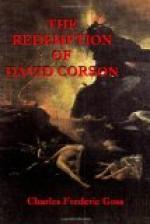A few moments’ walking brought him to a weird spectacle. A torch had been erected above a low platform on which stood a man of most unique and striking personality. He looked like a giant in the wavering light of the torch. He was dressed in the simple garb of a Quaker; his head was bare; great locks of reddish hair curled round his temples and fell down upon his shoulders. His massive countenance bespoke an extraordinary mind, and beamed with rest and peace.
As he sang the old familiar hymn, he looked around upon his audience with an expression such as glowed, no doubt, from the countenance of the Christ when He spoke to the multitudes on the shores of Lake Genessaret.
Close to the small platform was a circle of street Arabs, awed into silence and respect by the charm of this remarkable personality. Next to them came a ring of women—some of them old and gray, with haggard and wrinkled countenances upon which Time, with his antique pen, had traced many illegible hieroglyphs; some of them young and bedizened with tinsel jewelry and flashy clothing; not a few of them middle-aged, wan, dispirited and bearing upon their hips bundles wrapped in faded shawls, from which came occasionally that most distressing of sounds, the wail of an ill-fed and unloved infant, crying in the night.
Outside of this zone of female misery and degradation, there was a belt of masculine stupidity and crime; men with corpulent bodies, bull necks, double chins, pile-driving heads; men of shrunken frames, cadaverous cheeks, deep-set and beady eyes—vermin-covered, disease-devoured, hope-deserted. They clung around him, these concentric circles of humanity, like rings around a luminous planet, held by they knew not what resistless attraction.
The simple melody, borne upon the pinions of that resonant and cello-like voice, attained an almost supernatural influence over their perverted natures. When it ceased, an audible sigh arose, an involuntary tribute of adoration and of awe.
As soon as he had finished his hymn, this consecrated apostle to the lost sheep of the great city opened a well-worn volume.
The passage which he read, or rather chanted, was the fifty-third chapter of Isaiah, the awe-inspiring sentences sending through the circles of humanity which were tightening about him visible vibrations.
When he finished his reading, he began an address full of homely wit and pathos, in which, with all the rich and striking imagery culled from a varied life in the wildernesses of the great forests and the great cities of our continent, he appealed to that consciousness of “the true, the beautiful and the good” which he believed to lie dormant, but capable of resurrection, in the soul of every man.
A few of his auditors were too far gone with fatigue or intoxication to follow him, and elbowing their way through the crowd shot off into the night upon their various tangents of stupidity or crime; but most of the spectators listened with a sort of rapt and involuntary attention.




